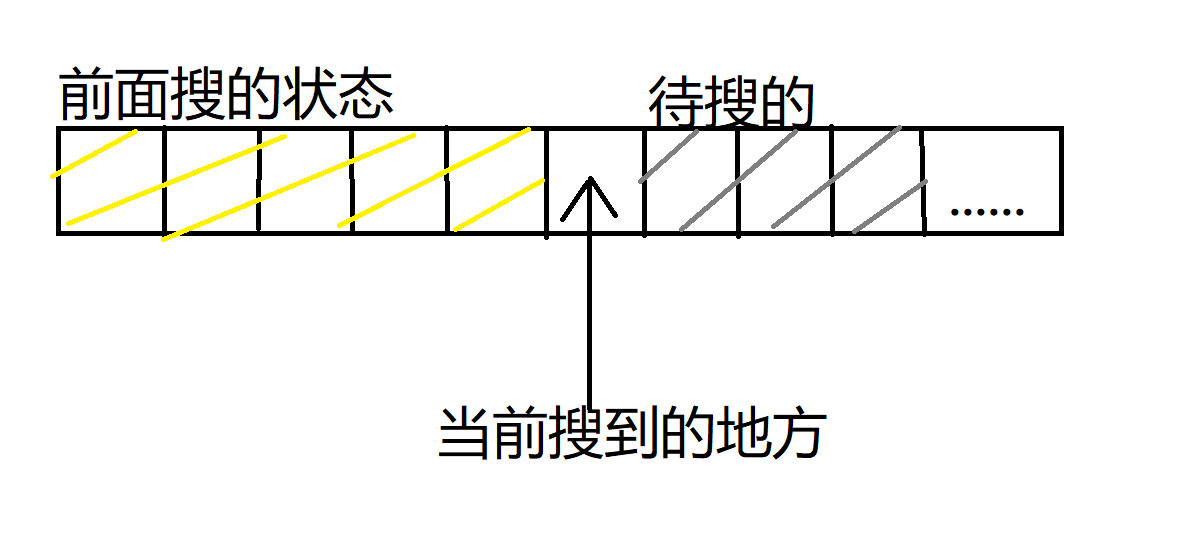数位DP及模板
数位DP:
一般来说数位DP有两种写法:1.for循坏枚举DP 2.记忆化搜索+DP
这里详细将记忆化搜索+DP
DFS状态:
常见的dfs状态有三个:
1.枚举到第几位(POS)
2.判断前面是否紧贴上限(LIMIT)
3.前面的数是否全为前导0 (ZERO)
这三个状态如何转移到下一位呢?
1.pos→pos+1
2.limit→limit&&a[i]=当前这位最高位
3.zero→zero&&a[i]=0
重点:dfs的核心是深搜,一搜搜到底,搜到底了,代表我们搜完了一个数,return 1;
现在问有多少的数比12345小
1.关于前导0:00999→999,09999→9999
2.关于limit前面的数是否紧贴上限
如果前面的数是紧贴上限的,当前这位枚举的上限便是当前数的上限
如果前面的数不是紧贴上限的,当前这位枚举的上限便是 9
3.关于DP维度
一般来说,DFS有几个状态,DP就几个维度
比如现在DP就是DP [pos] [limt] [zero]
4.关于记忆化DP
现在枚举到了 10××× 和 11×××
显然 这两种状态后面的×××状态数是一样的
重点:dp[pos][limit][zero]表示前面的数枚举状态确定,后面的数有多少种可能
5.关于DP细节
一般来说我们一开始都memset(dp,-1,sizeof(dp))
如果dp[pos][limt][zero]!=-1 return dp[pos][limit][zero];
6.关于初始化:
一开始 limit 是1,表示一开始的数只能选 1~a[1]
一开始zero 是1,假定表示前面的数全为0
最后放个数位DP模板:(询问 L~R 之间有多少的数)
#include<bits/stdc++.h> using namespace std; #define ll long long #define mp make_pair #define pb push_back //vector函数 #define popb pop_back //vector函数 #define fi first #define se second const int N=20; //const int M=; //const int inf=0x3f3f3f3f; //一般为int赋最大值,不用于memset中 //const ll INF=0x3ffffffffffff; //一般为ll赋最大值,不用于memset中 int T,n,len,a[N],dp[N][2][2]; inline int read() { int x=0,f=1;char ch=getchar(); while(ch<'0'||ch>'9'){if(ch=='-')f=-1;ch=getchar();} while(ch>='0'&&ch<='9'){x=(x<<1)+(x<<3)+(ch^48);ch=getchar();} return x*f; } int dfs(int pos,bool lim,bool zero) { if(pos>len) return 1; if(dp[pos][lim][zero]!=-1) return dp[pos][lim][zero]; int res=0,num=lim?a[pos]:9; for(int i=0;i<=num;i++) res+=dfs(pos+1,lim && i==num,zero && i==0 ); return dp[pos][lim][zero]=res; } int solve(int x) { len=0; memset(dp,-1,sizeof(dp)); for(;x;x/=10) a[++len]=x%10; reverse(a+1,a+len+1); return dfs(1,1,1); } int main() { // freopen("","r",stdin); // freopen("","w",stdout); int l=read(),r=read(); printf("%d\n",solve(r)-solve(l-1)); return 0; }
还有另外一种形式的记忆化,这种是dp状态中少了 Limit 和Zero ,但是相应的速度可能远不如上面一个,但适合多组数据:
#include<bits/stdc++.h> using namespace std; #define ll long long #define mp make_pair #define pb push_back #define popb pop_back #define fi first #define se second #define popcount __builtin_popcount const int N=10; const int M=70; //const int inf=0x3f3f3f3f; //const ll INF=0x3ffffffffffff; int T,n,b,len,a[M]; ll dp[12][70][2000]; inline int read() { int x=0,f=1;char ch=getchar(); while(ch<'0'||ch>'9'){if(ch=='-')f=-1;ch=getchar();} while(ch>='0'&&ch<='9'){x=(x<<1)+(x<<3)+(ch^48);ch=getchar();} return x*f; } ll dfs(int b,int pos,bool lim,bool zero,int status) { if(!pos) { // printf("%d %d %d\n",pos,status,zero); if(zero) return 0; if(!status) return 1; else return 0; } if(!lim&&!zero&&dp[b][pos][status]!=-1) return dp[b][pos][status]; int num=lim?a[pos]:b-1; ll res=0; for(int i=0;i<=num;i++) { if(zero&&!i) res+=dfs(b,pos-1,lim&&i==num,zero&&!i,status); else res+=dfs(b,pos-1,lim&&i==num,zero&&!i,status^(1<<i)); } if(!lim&&!zero) dp[b][pos][status]=res; return res; } ll solve(ll x) { len=0; // memset(dp,-1,sizeof(dp)); for(;x;x/=b) a[++len]=x%b; // reverse(a+1,a+len+1); return dfs(b,len,1,1,0); } int main() { // freopen("","r",stdin); // freopen("","w",stdout); // ios::sync_with_stdio(0); // cin.tie(0); for(int i=2;i<=10;i++) memset(dp,-1,sizeof(dp)); T=read(); while(T--) { b=read(); ll l,r; scanf("%lld%lld",&l,&r); printf("%lld\n",solve(r)-solve(l-1)); } return 0; }



 浙公网安备 33010602011771号
浙公网安备 33010602011771号